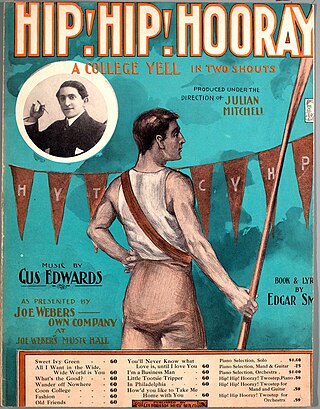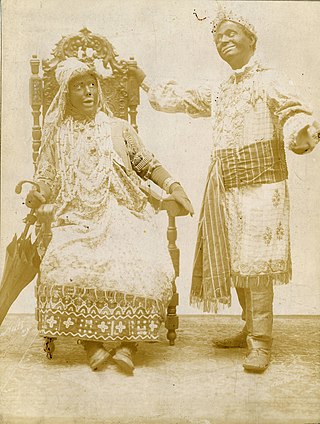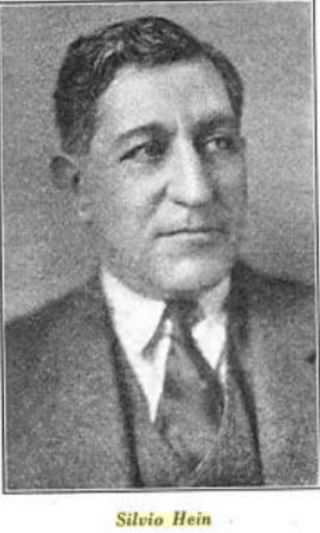Related Research Articles

Jean Schwartz was a Hungarian-born Jewish American composer and pianist. He is best known for his work writing the scores for more than 30 Broadway musicals, and for his creation of more than 1,000 popular songs with the lyricist William Jerome. Schwartz and Jerome also performed together on the vaudeville stage in the United States; sometimes in collaboration with Maude Nugent, Jerome's wife, and the Dolly Sisters. Schwartz was married to Jenny Dolly from 1913 to 1921.
Henry Martyn Blossom Jr. was an American writer, playwright, novelist, opera librettist, and lyricist. He first gained wide attention for his second novel, Checkers: A Hard Luck Story (1896), which was successfully adapted by Blossom into a 1903 Broadway play, Checkers. It was Blossom's first stage work and his first critical success in the theatre. The play in turn was adapted by others creatives into two silent films, one in 1913 and the other in 1919, and the play was the basis for the 1920 Broadway musical Honey Girl. Checkers was soon followed by Blossom's first critical success as a lyricist, the comic opera The Yankee Consul (1903), on which he collaborated with fellow Saint Louis resident and composer Alfred G. Robyn. This work was also adapted into a silent film in 1921. He later collaborated with Robyn again; writing the book and lyrics for their 1912 musical All for the Ladies.

The Wizard of the Nile is a comic opera in three acts with music by composer Victor Herbert and a libretto by Harry B. Smith. This was Herbert's second comic opera after Prince Ananias, and was his first real success.
Stanislaus Stange (1862–1917) was a playwright, librettist and lyricist who created many Broadway shows in the fin-de-siecle era and early 20th century. After minor success as an actor, Stange made his career as a writer in the musical theatre, moving towards more varied theatrical work before his death.
Frederick J. Eustis, sometime referred to as F. J. Eustis, was an American composer, conductor, and theatre director. He is best remembered for writing music for several Broadway musicals.

Louis Harrison was an actor, playwright, comedian, lyricist, librettist, and theatre director. As both a performer and playwright, he was mainly active within the genres of musical theatre and light opera.
The Errand Boy is a musical in two acts with lyrics by Edward P. Moore and a book by George Totten Smith. Created as a starring vehicle for vaudeville star Billy B. Van, the composer of the music for this work was never credited. Set in the town of Georges Mills, New Hampshire, the plot centers around the local errand boy Patsy Bolivar who becomes involved with a troupe of traveling performers stranded in his town.
Frederic G. Ranken was an American librettist, lyricist, and playwright for light operas and musicals staged on Broadway from 1899 through 1907. His greatest success was the libretto for Reginald De Koven's 1905 comic opera Happyland. He also wrote libretti for composers Victor Herbert and Ludwig Engländer, and was a lyricist for composers Alfred Baldwin Sloane and Gustave Kerker among others. As a playwright he wrote the books for several musicals.
Paul West was an American playwright, lyricist, newspaper editor, journalist, screenwriter, author, and talent agent. After working as a journalist in Massachusetts from 1888 to 1892, he began his career in the theatre as a press representative for Charles H. Hoyt; followed by a season as the business manager for the opera singer and actress Camille D'Arville and the comedian Frank Daniels. From 1898 to 1911 he worked on the editorial staff The New York Sunday World during which time be began a career as a prolific lyricist for both Broadway musicals and Tin Pan Alley publishers of popular song; publishing more the 500 songs during his lifetime. He also worked as a playwright, penning both plays and the books for several musicals. More than 15 of his stage works were mounted on Broadway between the years 1902–1913. In 1904 his children's book The Pearl and the Pumpkin was published; a work which he later adapted into a 1905 musical.

Hip! Hip! Hooray! is a musical in two acts with music by Gus Edwards and both lyrics and book by Edgar Smith.
The Floor Walkers was a road musical that was created as a starring vehicle for the comedy duo of Hap Ward and Harry Vokes to feature their signature roles of the tramps Lord Percy Harden and Lord Harold Poorly ; characters the duo had previously portrayed in the earlier musicals A Run On the Bank (1895) and The Governors (1898). The Floor Walkers had no attributed author for its book or lyrics, but the music for the production was created by composer Herbert Dillea who also served as the musical's music director. The most well known song from the show was "Absence Makes the Heart Grow Fonder"; which was the only song to have an attributed lyricist, Arthur Gillespie. This song was for a time a popular standard and was recorded multiple times by singer Harry Macdonough and cornetist Jules Levy for records made for the Victor Talking Machine Company and Columbia Records from 1902 through 1905, and later was recorded by Wayne King in 1947.

The Ham Tree is a "musical vaudeville" in three acts with music by Jean Schwartz, lyrics by William Jerome, and a book by George V. Hobart. A popular success from its debut in 1905, the work toured for several years; including three separate runs on Broadway. The work was created as a starring vehicle for vaudeville and minstrel show stars James McIntyre and Thomas Heath who were known for their work as blackface performers. The work incorporated several of their prior popular routines and sketches from their work on the vaudeville stage in order to appeal to their fan base. The concept of a "ham tree", along with other humorous trees like an "egg tree", was a repeating gag in their works dating back to their performances in The Georgia Minstrels in the 1890s and early 1900s. Following its initial tour, the work was revived by McIntyre and Heath several times, and was later heavily revised and retitled Hello, Alexander for a Broadway staging in 1919.
Mrs. Delaney of Newport is a musical in three acts with music by Jean Schwartz and both book and lyrics by William Jerome. Written as a starring vehicle for the comedian Kate Elinore and her sister May Elinore, it was the first of several musicals created by the songwriting team of Schwartz and Jerome. The musical premiered on September 15, 1903, at the Collingwood Opera House in Poughkeepsie, New York. The production was produced by the firm of Hyde and Benham.
Up and Down Broadway is a musical revue in two acts with music by Jean Schwartz, lyrics by William Jerome, and a book Edgar Smith. The musical's loose plot concerns the god Apollo who arrives in New York City in the accompany of other Greek deities vowing to improve the theatrical tastes of the American public. In the end they decide Broadway knows more about great entertainment than the Greek gods do. The musical was written as a starring vehicle for Eddie Foy who portrayed the main servant of Apollo, Momus, and provided much of the work's comedic thrust.
John J. McNally was an American playwright, journalist, and drama critic. As a playwright he is best known for penning the books for many Broadway musicals staged between the years 1895–1909. Many of these were crafted for the Rogers Brothers, or were created in collaboration with the songwriting team of Jean Schwartz and William Jerome. He was a longtime drama critic and editor for various Boston newspapers.
Fritz in Tammany Hall is a musical in three acts with music by Jean Schwartz, lyrics by William Jerome, and a book by John J. McNally. The musical takes place in 1905 in New York City and on Long Island. It was a political spoof of New York City politics of that period.
When Claudia Smiles is a musical in three acts with music by Jean Schwartz and both book and lyrics by Anne Caldwell. Set in New York City, the work is based on Leo Ditrichstein's 1903 play Vivian's Papas. The musical began its Broadway run at the 39th Street Theatre on February 2, 1914, and then transferred to the Lyric Theatre where it ultimately closed on March 21, 1914, after 56 performances. The production was directed by Charles Winninger and produced by Frederic McKay. The cast included Blanche Ring, Mahlon Hamilton, Anna Laughlin, and Bertha Mann.

Silvio Hein was an American composer, songwriter, conductor, and theatrical producer. He was a songwriter for Tin Pan Alley and composed the scores to fourteen Broadway musicals. His most successful stage work was the 1917 musical Flo-Flo which he created with the French librettist and playwright Fred de Gresac. His songs were also interpolated into musicals created by others, including The Little Duchess and Ziegfeld Follies. In addition to his work writing music, he also worked as both a conductor and producer on Broadway. In 1914 he was a founding member of the American Society of Composers, Authors and Publishers.
Owen Murphy was an American songwriter, film maker, and writer for radio, film, and theatre. He worked as a lyricist, composer, and playwright for Broadway musicals and as a songwriter for Tin Pan Alley in the 1920s and 1930s. As a film maker he was an early maker of industrial films. He also was a writer for comedian Joe Cook for both the stage and radio.
References
Citations
Bibliography
- Bloom, Ken (1996). American Song: A-S. Schirmer Books. ISBN 9780028645735.
- Bordman, Gerald Martin; Norton, Richard (2010). American Musical Theatre: A Chronicle. Oxford University Press. ISBN 9780199729708.
- Dietz, Dan (2022). The Complete Book of 1900s Broadway Musicals. Rowman & Littlefield Publishers. ISBN 9781538168943.
- Gould, Neil (2009). Victor Herbert: A Theatrical Life. Fordham University Press. ISBN 9780823228737.
- Mordden, Ethan (2015). The Happiest Corpse I've Ever Seen: The Last Twenty-Five Years of the Broadway Musical. St. Martin's Publishing Group. ISBN 9781466893443.